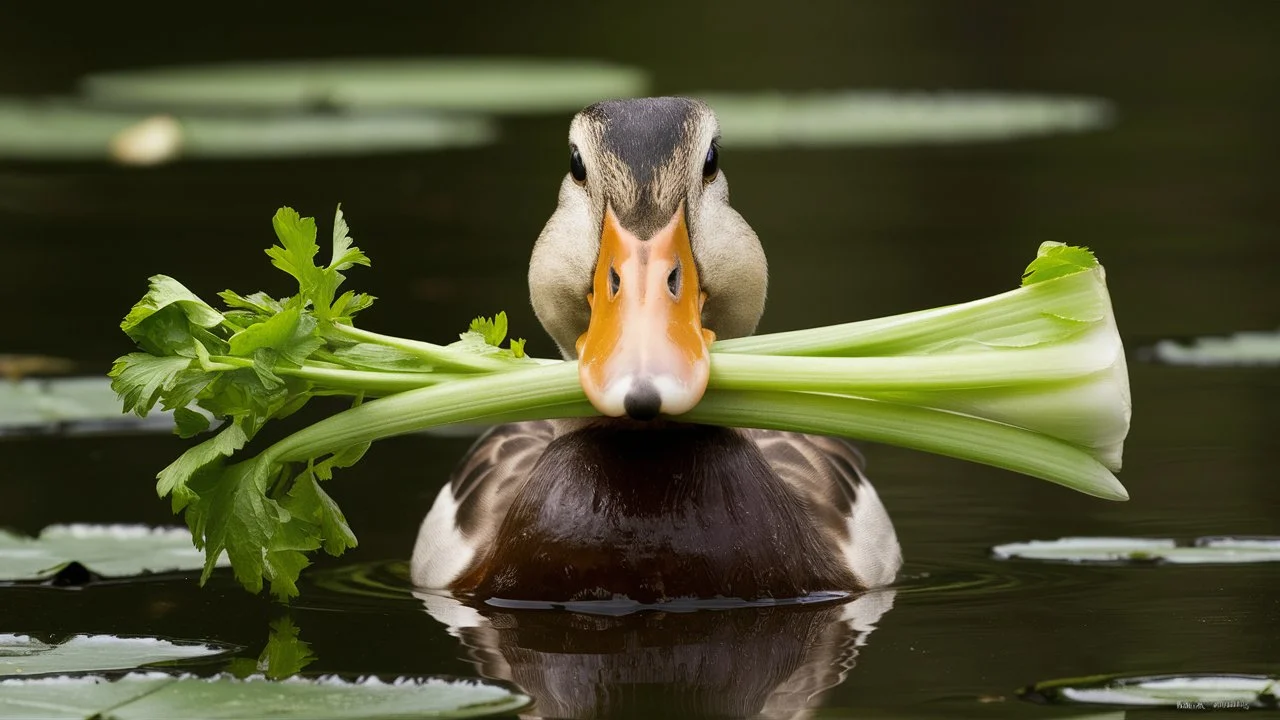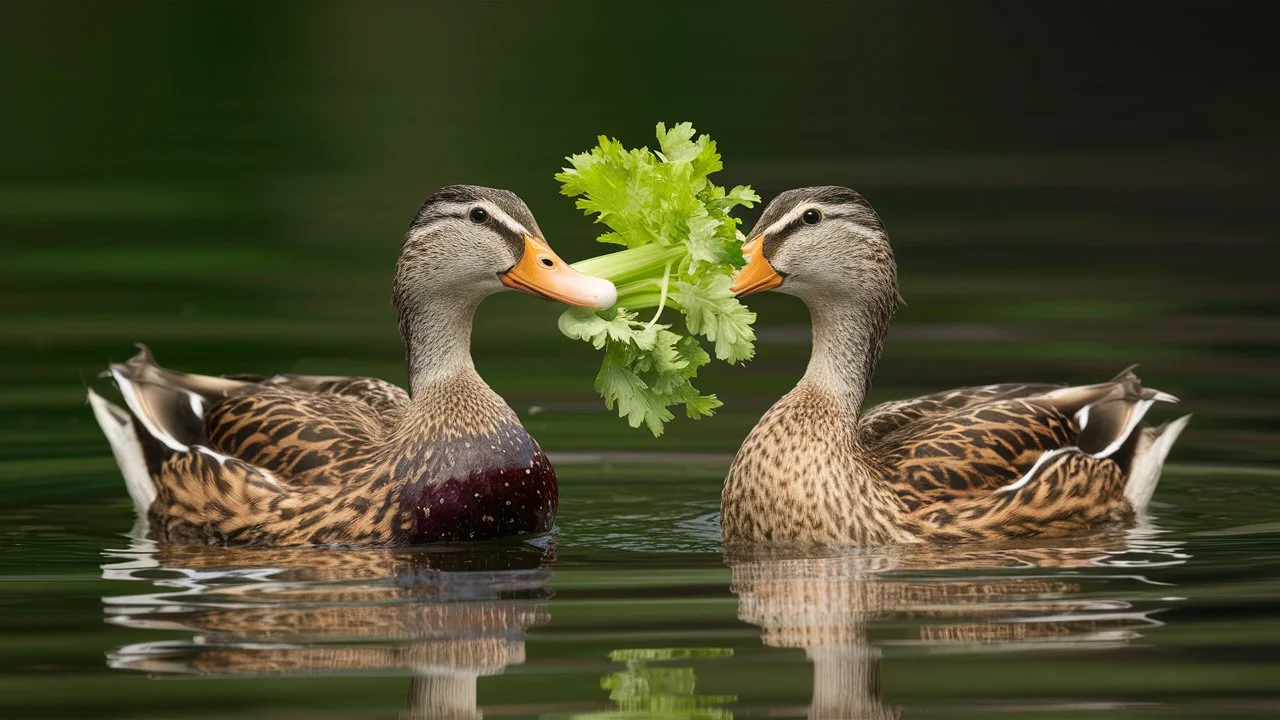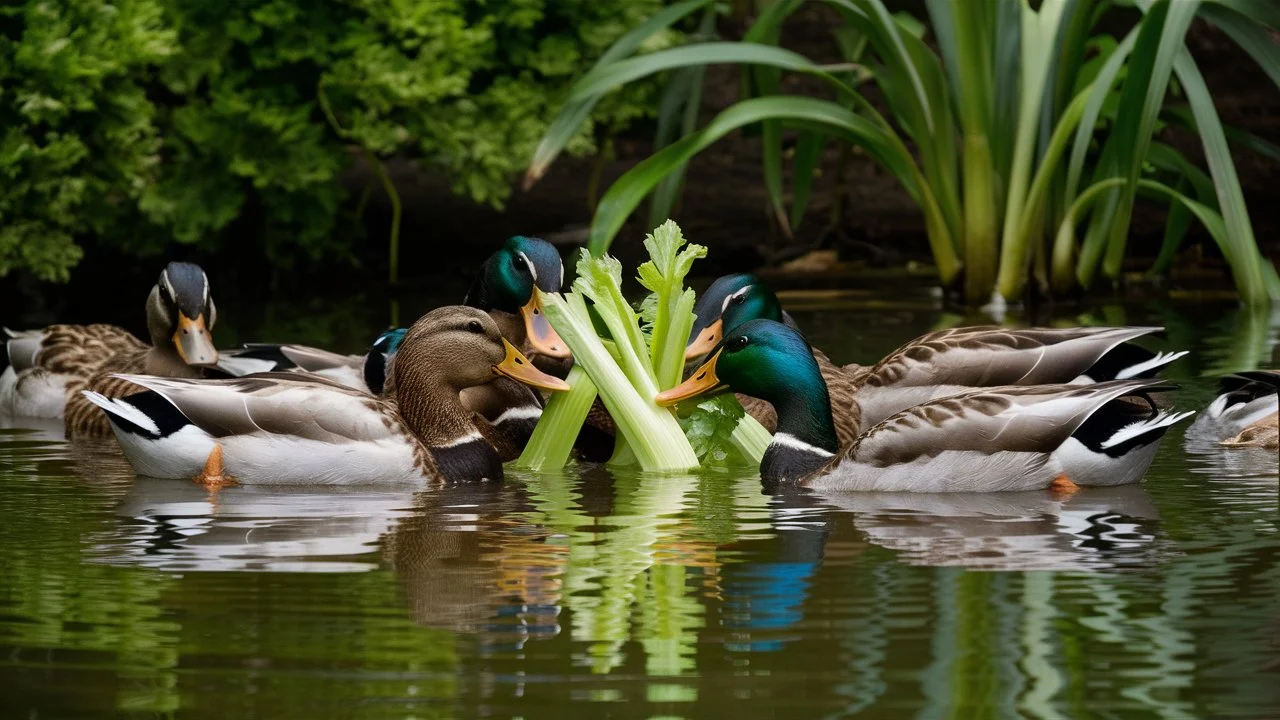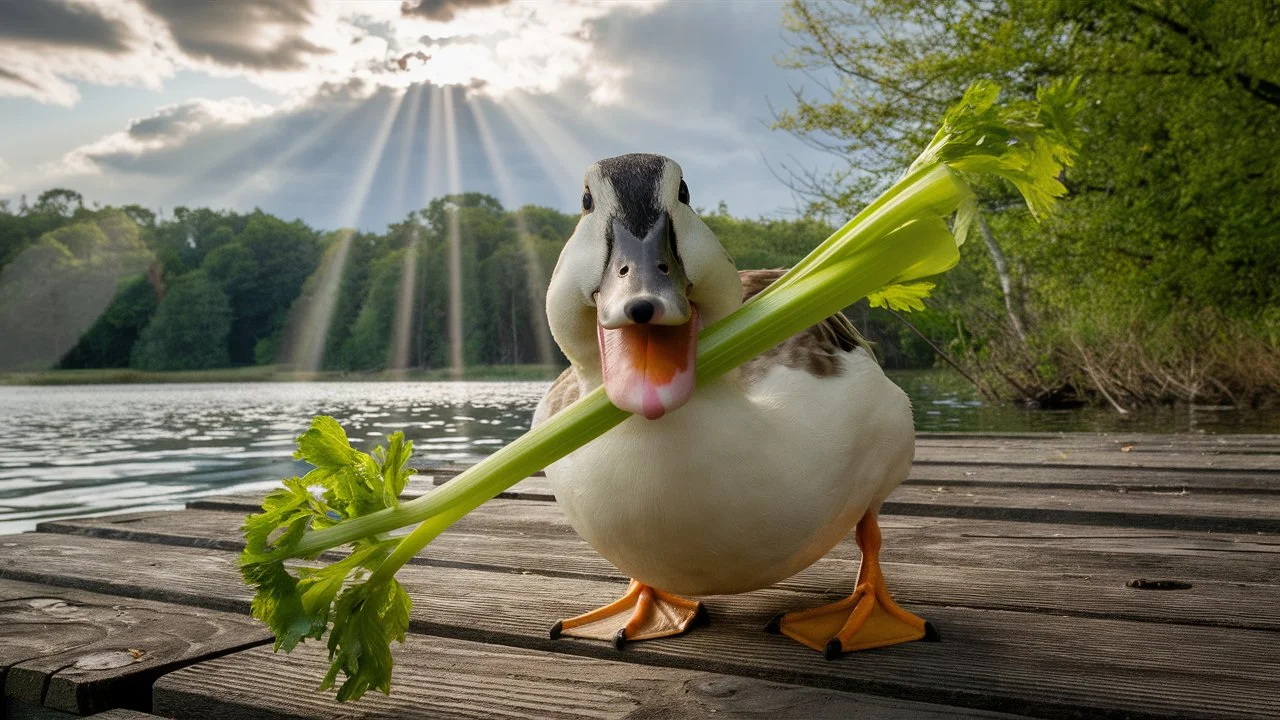Yes, ducks can eat celery. Celery is safe and nutritious for ducks, providing vitamins, minerals, and hydration. However, it should be given in moderation as part of a balanced diet, and it is best to chop it into small pieces to make it easier for ducks to eat.
Table of Contents
ToggleDo Ducks Eat Celery?
Ducks are lovely birds that many people enjoy watching. They can be found in ponds, lakes, rivers, and even in backyards. One question that people often ask is, “Do ducks eat celery?” The answer is yes, ducks can eat celery.
Related reading: What Ducks Eat in the Wild?

What Do Ducks Normally Eat?
Ducks are omnivores, which means they eat both plants and animals. In the wild, ducks eat a variety of foods such as:
- Small fish
- Insects
- Worms
- Snails
- Aquatic plants
- Seeds
- Grains
They have a diverse diet that helps them get all the nutrients they need to stay healthy and strong.
Can Ducks Eat Vegetables?
Yes, ducks can eat vegetables. Vegetables are a good source of vitamins and minerals for ducks. Some vegetables that ducks can eat include:
- Lettuce
- Spinach
- Peas
- Carrots
- Cabbage
- Celery
It is important to give ducks a variety of vegetables to ensure they get a balanced diet.
Celery for Ducks
Celery is a vegetable that is safe for ducks to eat. It is crunchy and has a mild taste. Celery is low in calories and has some vitamins and minerals that are good for ducks.
Nutrients in Celery
Celery contains the following nutrients:
- Vitamin K: Helps with blood clotting and bone health.
- Vitamin C: Supports the immune system and helps with the growth and repair of tissues.
- Vitamin A: Important for good vision and a healthy immune system.
- Fiber: Helps with digestion and keeps the digestive system healthy.
These nutrients can help ducks stay healthy and active.
How to Prepare Celery for Ducks
When feeding celery to ducks, it is important to prepare it properly:
- Wash the Celery: Always wash the celery thoroughly to remove any dirt or pesticides.
- Chop into Small Pieces: Cut the celery into small pieces to make it easier for the ducks to eat. Ducks do not have teeth, so they need small pieces to swallow easily.
- Mix with Other Foods: It is a good idea to mix celery with other vegetables or duck food to provide a balanced diet.
How Much Celery Can Ducks Eat?
While celery is safe for ducks, it should not be the only food they eat. Ducks need a balanced diet that includes a variety of foods. Celery can be given as a treat or as part of their regular diet, but it should not make up more than 10-20% of their total food intake. Too much celery can cause digestive issues because it is high in fiber.
Benefits of Feeding Celery to Ducks
Feeding celery to ducks has several benefits:
- Hydration: Celery has a high water content, which helps keep ducks hydrated, especially on hot days.
- Low in Calories: Celery is low in calories, making it a good treat that won’t lead to weight gain.
- Vitamins and Minerals: The vitamins and minerals in celery help support overall duck health.
Observing Your Ducks
When introducing any new food to ducks, it is important to observe them to make sure they are eating it properly and not having any adverse reactions. Some ducks may take a little time to get used to new foods, while others may enjoy them right away.
Other Safe Foods for Ducks
In addition to celery, there are many other foods that are safe for ducks to eat. Here are some examples:
- Fruits: Ducks can eat fruits like apples, berries, grapes, and melons. Make sure to cut them into small pieces and remove any seeds or pits.
- Vegetables: Other safe vegetables include peas, corn, cucumber, and zucchini.
- Grains: Ducks can eat grains like rice, oats, and barley. Cooked grains are easier for them to digest.
- Protein Sources: Ducks can have small amounts of protein from foods like boiled eggs, mealworms, and small fish.
Foods to Avoid
While many foods are safe for ducks, there are some that should be avoided:
- Bread: Bread is not good for ducks because it lacks nutritional value and can cause digestive problems.
- Chocolate: Chocolate is toxic to ducks and should never be given to them.
- Onions and Garlic: These can cause digestive upset and are not recommended for ducks.
- Avocado: Avocado contains a substance called persin, which is toxic to ducks.
- Salty Foods: Foods high in salt can be harmful to ducks.
Do Ducks Eat Celery Leaves?
Ducks are curious and adaptable eaters, often exploring different types of food. Celery leaves, the leafy part of the celery plant, are not an exception. But are celery leaves safe for ducks, and do they enjoy eating them? Let’s dive into this topic to provide a clear answer.

What Are Celery Leaves?
Celery leaves are the green, leafy tops of the celery plant. They are often overlooked and discarded by humans but are actually quite nutritious. Celery leaves contain vitamins and minerals similar to the celery stalks, but they are more concentrated.
Nutrients in Celery Leaves
Celery leaves are rich in the following nutrients:
- Vitamin K: Important for blood clotting and bone health.
- Vitamin C: Supports the immune system and helps with tissue repair.
- Vitamin A: Essential for good vision and a healthy immune system.
- Antioxidants: Help protect cells from damage.
These nutrients make celery leaves a healthy addition to a duck’s diet.
Can Ducks Eat Celery Leaves?
Yes, ducks can eat celery leaves. They are safe and nutritious for ducks. Ducks generally enjoy eating green leafy vegetables, and celery leaves can be a good part of their diet.
Benefits of Celery Leaves for Ducks
Feeding celery leaves to ducks can offer several benefits:
- Nutrient-Rich: Celery leaves provide essential vitamins and minerals.
- Hydration: Like the stalks, celery leaves have a high water content, which helps keep ducks hydrated.
- Variety: Adding different types of greens to a duck’s diet can keep their meals interesting and well-rounded.
How to Feed Celery Leaves to Ducks
When feeding celery leaves to ducks, it is important to prepare them properly:
- Wash the Leaves: Thoroughly wash the celery leaves to remove any dirt or pesticides.
- Chop into Small Pieces: Cut the leaves into small, manageable pieces to make it easier for ducks to eat.
- Mix with Other Foods: Mixing celery leaves with other vegetables or duck food can help ensure a balanced diet.
How Much Celery Leaves Can Ducks Eat?
While celery leaves are good for ducks, they should be given in moderation. Too many celery leaves can cause digestive issues due to their high fiber content. It’s best to offer celery leaves as part of a varied diet that includes other vegetables, grains, and protein sources.
Observing Your Duck
When introducing celery leaves or any new food to ducks, observe them closely. Make sure they are eating the leaves properly and not showing any signs of discomfort or adverse reactions. Ducks may take a little time to get used to new foods, but with patience, they will likely enjoy the variety.
Other Safe Greens for Ducks
In addition to celery leaves, ducks can enjoy a variety of other green leafy vegetables:
- Lettuce: Particularly romaine lettuce, which is more nutritious than iceberg lettuce.
- Spinach: Packed with vitamins and minerals.
- Kale: A nutrient-dense green that is very healthy for ducks.
- Dandelion Greens: These are safe and nutritious for ducks to eat.
- Cabbage: Both green and red cabbage can be given to ducks in moderation.
Foods to Avoid
While many greens are safe for ducks, some should be avoided:
- Onion and Garlic Leaves: These can cause digestive upset and are not recommended for ducks.
- Rhubarb Leaves: These are toxic to ducks and should never be fed to them.
- Tomato Leaves: These are also toxic and should be avoided.
Do Ducks Eat Celery in the Winter?
Ducks are adaptable birds that can adjust their diet based on the availability of food throughout the year, including winter. As the seasons change, so does their food supply, but do ducks eat celery in the winter? Let’s explore this topic in detail.

Ducks’ Diet in Winter
In winter, the natural food sources for ducks can become scarce due to colder temperatures and frozen water bodies. Ducks will still try to find food in their environment, but they might rely more on what people provide. In colder months, ducks need a diet that helps them maintain their energy and stay warm.
Can Ducks Eat Celery in Winter?
Yes, ducks can eat celery in the winter. Celery can be a good addition to their diet during the colder months. It provides hydration and essential nutrients that can help support their health when other food sources might be less available.
Nutritional Benefits of Celery for Ducks in Winter
- Hydration: Even in winter, ducks need to stay hydrated. Celery has a high water content that can help with this.
- Vitamins and Minerals: Celery provides important vitamins and minerals such as vitamin K, vitamin C, vitamin A, and fiber, which can support a duck’s immune system and overall health.
- Low Calories: Celery is low in calories, which is good for maintaining a healthy weight while still providing necessary nutrients.
Preparing Celery for Ducks in Winter
When feeding celery to ducks in winter, proper preparation is essential:
- Wash the Celery: Ensure the celery is clean and free from pesticides or dirt.
- Chop into Small Pieces: Cut the celery into small, manageable pieces so ducks can eat it easily.
- Mix with Other Foods: Combining celery with other foods can provide a balanced diet. Ducks need a variety of foods to get all the nutrients they need.
How Much Celery Should Ducks Eat in Winter?
While celery is beneficial, it should not be the only food ducks eat. A balanced diet is essential for their health, especially in winter when they need extra energy to stay warm. Celery should make up no more than 10-20% of their diet. Provide other foods such as grains, seeds, and protein sources like mealworms or small fish.
Other Foods for Ducks in Winter
In addition to celery, there are several other foods that can help keep ducks healthy during the winter:
- Grains: Whole grains like oats, barley, and cracked corn provide energy.
- Vegetables: Other vegetables like peas, spinach, and kale are also nutritious.
- Fruits: Apples (without seeds), berries, and grapes can be good treats.
- Protein Sources: Mealworms, small fish, and boiled eggs offer necessary protein.
Feeding Ducks in Winter: Tips and Considerations
- Regular Feeding: If you decide to feed ducks in the winter, try to do it regularly. Ducks can become dependent on human-provided food if their natural sources are scarce.
- Avoid Bread: Bread is not nutritious for ducks and can cause health problems. Stick to natural, healthy foods.
- Provide Fresh Water: Ducks need access to fresh, unfrozen water for drinking and eating. Make sure they have a water source that is not frozen over.
Observing Ducks’ Health
Pay attention to the ducks’ behavior and health. If they seem sluggish or unwell, it might indicate that their diet needs adjustment. Ducks need more energy in winter to stay warm, so ensure they are getting enough calories from a balanced diet.
Conclusion
In conclusion, ducks can eat celery, and it can be a healthy addition to their diet. Celery provides hydration, vitamins, and minerals that support duck health. However, it should be given in moderation as part of a balanced diet that includes a variety of foods. Always prepare celery properly by washing and cutting it into small pieces, and observe your ducks to ensure they are eating it without any problems. By providing a balanced diet, you can help your ducks stay healthy, happy, and active

